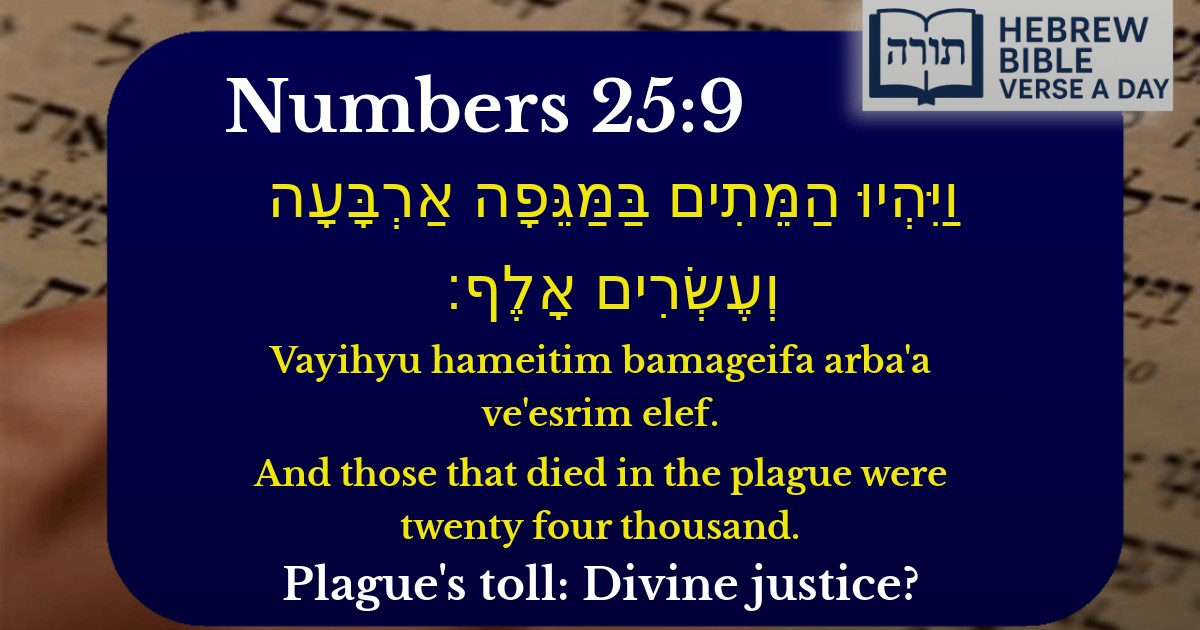Join Our Newsletter To Be Informed When New Videos Are Posted
Join the thousands of fellow Studends who rely on our videos to learn how to read the bible in Hebrew for free!
Hebrew Text
וַיִּהְיוּ הַמֵּתִים בַּמַּגֵּפָה אַרְבָּעָה וְעֶשְׂרִים אָלֶף׃
English Translation
And those that died in the plague were twenty four thousand.
Transliteration
Vayihyu hameitim bamageifa arba'a ve'esrim elef.
Hebrew Leining Text
וַיִּהְי֕וּ הַמֵּתִ֖ים בַּמַּגֵּפָ֑ה אַרְבָּעָ֥ה וְעֶשְׂרִ֖ים אָֽלֶף׃ <span class="mam-spi-pe">{פ}</span><br>
וַיִּהְי֕וּ הַמֵּתִ֖ים בַּמַּגֵּפָ֑ה אַרְבָּעָ֥ה וְעֶשְׂרִ֖ים אָֽלֶף׃ {פ}
🎵 Listen to leining
Parasha Commentary
📚 Talmud Citations
This verse is quoted in the Talmud.
📖 Yoma 22b
The verse is referenced in a discussion about the consequences of sin and divine punishment, comparing the plague mentioned in the verse to other instances of divine retribution.
📖 Sanhedrin 82a
The verse is cited in the context of discussing the severity of the sin of Baal Peor and the resulting plague, emphasizing the tragic outcome of the Israelites' actions.


Context of the Verse
The verse (Numbers 25:9) describes the aftermath of the plague that struck Bnei Yisrael due to their involvement in the sin of Baal Peor. This event occurred when the Israelites were seduced by the Moabite and Midianite women into idolatry and immorality, leading to divine retribution.
Rashi's Explanation
Rashi (Rabbi Shlomo Yitzchaki) comments that the 24,000 who perished in the plague were from the tribe of Shimon. He bases this on the juxtaposition of this verse with the earlier listing of the leaders of each tribe (Numbers 25:14), where Zimri, a prince of Shimon, was publicly involved in the sin. Rashi further notes that this plague was a manifestation of divine justice, as the tribe of Shimon was particularly implicated in the transgression.
Midrashic Insights
The Midrash (Bamidbar Rabbah 21:3) elaborates that the plague was halted through the zealous actions of Pinchas, who executed Zimri and Kozbi, thus atoning for the people. The number 24,000 is also connected to the 24,000 students of Rabbi Akiva who perished during the Sefirah period, drawing a parallel between the consequences of sin and the importance of proper conduct.
Rambam's Perspective
Maimonides (Rambam) in Mishneh Torah (Hilchot Teshuvah 1:4) discusses the severity of communal sin and its repercussions. He explains that the plague served as a collective punishment to purify the nation and reinforce the gravity of abandoning Torah values. The large number of deaths underscores the principle that public desecration of Hashem's name carries severe consequences.
Additional Commentaries